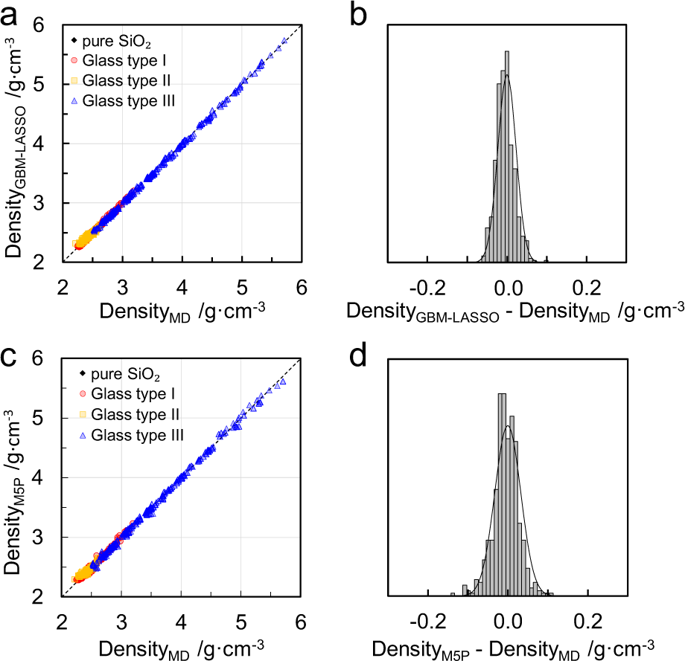npj Computational Materials ( IF 9.4 ) Pub Date : 2020-03-20 , DOI: 10.1038/s41524-020-0291-z Yong-Jie Hu , Ge Zhao , Mingfei Zhang , Bin Bin , Tyler Del Rose , Qian Zhao , Qun Zu , Yang Chen , Xuekun Sun , Maarten de Jong , Liang Qi

|
Chemical design of SiO2-based glasses with high elastic moduli and low weight is of great interest. However, it is difficult to find a universal expression to predict the elastic moduli according to the glass composition before synthesis since the elastic moduli are a complex function of interatomic bonds and their ordering at different length scales. Here we show that the densities and elastic moduli of SiO2-based glasses can be efficiently predicted by machine learning (ML) techniques across a complex compositional space with multiple (>10) types of additive oxides besides SiO2. Our machine learning approach relies on a training set generated by high-throughput molecular dynamic (MD) simulations, a set of elaborately constructed descriptors that bridges the empirical statistical modeling with the fundamental physics of interatomic bonding, and a statistical learning/predicting model developed by implementing least absolute shrinkage and selection operator with a gradient boost machine (GBM-LASSO). The predictions of the ML model are comprehensively compared and validated with a large amount of both simulation and experimental data. By just training with a dataset only composed of binary and ternary glass samples, our model shows very promising capabilities to predict the density and elastic moduli for k-nary SiO2-based glasses beyond the training set. As an example of its potential applications, our GBM-LASSO model was used to perform a rapid and low-cost screening of many (~105) compositions of a multicomponent glass system to construct a compositional-property database that allows for a fruitful overview on the glass density and elastic properties.
中文翻译:

通过机器学习预测SiO 2基玻璃的密度和弹性模量
具有高弹性模量和低重量的基于SiO 2的玻璃的化学设计引起人们极大的兴趣。然而,由于弹性模量是原子间键及其在不同长度尺度上的有序性的复杂函数,因此很难找到通用的表达式来预测合成前根据玻璃组成的弹性模量。在这里,我们表明,可以通过机器学习(ML)技术在除SiO 2之外还具有多种(> 10)添加剂氧化物的复杂成分空间中有效地预测SiO 2基玻璃的密度和弹性模量。我们的机器学习方法依赖于高通量分子动力学(MD)模拟生成的训练集,精心构建的描述符集,该描述符将经验统计模型与原子间键合的基本物理联系起来,以及由以下人员开发的统计学习/预测模型使用梯度增强机(GBM-LASSO)实现最小的绝对收缩和选择运算符。通过大量的仿真和实验数据对ML模型的预测进行了全面比较和验证。通过仅使用仅由二元和三元玻璃样品组成的数据集进行训练,我们的模型显示出非常有前途的预测k-nary SiO 2密度和弹性模量的能力型眼镜超出了培训范围。作为其潜在应用的一个例子,我们的GBM-LASSO模型用于对多组分玻璃系统的许多(〜10 5)成分进行快速且低成本的筛选,以构建成分-属性数据库,从而获得丰硕的概述关于玻璃的密度和弹性性能。











































 京公网安备 11010802027423号
京公网安备 11010802027423号